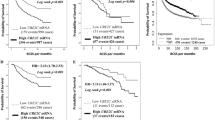Abstract
This study was conducted to analyze the expression of the ubiquitin-specific protease Usp28 and assess its clinical significance in human bladder cancer. mRNA and protein expression levels of Usp28 were determined by real-time polymerase chain reaction (PCR) and Western blot in 24 paired bladder cancers and the adjacent non-cancerous tissues. In addition, the expression of Usp28 protein in 186 bladder cancers was also determined by immunohistochemistry. The relationship between expression of Usp28 and clinico-pathologic features and prognosis was finally evaluated. Usp28 was expressed at a higher level in bladder cancers compared to adjacent non-cancerous tissues at both the mRNA and protein levels in 24 paired samples (all P < 0.01). In immunohistochemical examination, 78 (41.9 %) of 186 cases displayed low Usp28 expression in cancerous tissues, whereas 108 (58.1 %) cases displayed high Usp28 expression. In the universal analysis, Usp28 correlated strongly with histopathological grade, clinical stage, tumor number and recurrence rate (P = 0.0001, 0.0001, 0.0001 and 0.0051, respectively), but did not correlate with gender or age (P = 0.5588 and 0.6574). After multiple analysis of the above factors and consideration of confounding factors, tumor number, histological grade, clinical stage, and recurrence were related to Usp28 expression (P = 0.001, 0.001, 0.001 and 0.001, respectively). Finally, Usp28 expression was indentified as a independent predictors of survival (P = 0.001). Usp28 protein expression is potentially valuable in prognostic evaluation of bladder cancer.




Similar content being viewed by others
References
Jemal A, Siegel R, Xu J, Ward E. Cancer statistics, 2010. CA Cancer J Clin. 2010;60(5):277–300.
Edwards BK, Ward E, Kohler BA, et al. Annual report to the nation on the status of cancer, 1975–2006, featuring colorectal cancer trends and impact of interventions (risk factors, screening, and treatment) to reduce future rates. Cancer. 2010;116(3):544–73.
Eissa S, Kassim S, EI-Ahmady O. Detection of bladder tumors role of cytology, morphology-based assays, biochemical and molecular markers. Curr Opin Obstet Gynecol. 2003;15(5):395–403.
Shariat SF, Karam JA, Lerner SP. Molecular markers in bladder cancer. Curr Opin Urol. 2008;18(1):1–8.
Nijman SM, Luna-Vargas MP, Velds A, et al. A genomic and functional inventory of deubiquitinating enzymes. Cell. 2005;123(5):773–86.
Popov N, Wanzel M, Madiredjo M, et al. The ubiquitin-specific protease Usp28 is required for MYC stability. Nat Cell Biol. 2007;9:765–74.
Baffa R, Letko J, McClung C, LeNoir J, Vecchione A, Gomella LG. Molecular genetics of bladder cancer: targets for diagnosis and therapy. J Exp Clin Cancer Res. 2006;25(2):145–60.
Greene FL, Balch CM, Fleming ID, et al. AJCC cancer staging manual. 6th ed. New York: AJCC Springer-Verlag; 2002. p. 335–40.
Kim WJ, Park S, Kim YJ. Biomarkers in bladder cancer: present status and perspectives. Biomark Insights. 2007;27(2):95–105.
Radeva M, Hofmann T, Altenberg B, et al. The Database dbEST correctly predicts gene expression in colon cancer patients. Curr Pharm Biotechnol. 2008;9:509–14.
Garcia-España A, Salazar E, Sun TT, Wu XR, Pellicer A. Differential expression of cell cycle regulators in phenotypic variants of transgenically induced bladder tumors: implications for tumor behavior. Cancer. 2005;65(4):1150–7.
Salghetti SE, Kim SY, Tansey WP. Destruction of MYC by ubiquitin-mediated proteolysis: cancer-associated and transforming mutations stabilize MYC. EMBO J. 1999;18(3):717–26.
Bahram F, von der Lehr N, Cetinkaya C, Larsson LG. c-MYC hot spot mutations in lymphomas result in inefficient ubiquitination and decreased proteasome-mediated turnover. Blood. 2000;95(6):2104–10.
Welcker M, Orian A, Jin J, et al. The FBW7 tumor suppressor regulates glycogen synthase kinase 3 phosphorylation-dependent c-MYC protein degradation. Proc Natl Acad Sci U S A. 2004;101(24):9085–90.
Yada M, Hatakeyama S, Kamura T, et al. Phosphorylation-dependent degradation of c-MYC is mediated by the F-box protein FBW7. EMBO J. 2004;23(10):2116–25.
Yeh E, Cunningham M, Arnold H, et al. A signaling pathway controlling c-MYC degradation that impacts monogenic transformation of human cells. Nat Cell Biol. 2004;6(4):308–18.
Gregory MA, Hann SR. c-Myc proteolysis by the ubiquity proteasome pathway: stabilization of c-Myc in Burkitt’s lymphoma cells. Mol Cell Biol. 2000;20(7):2423–35.
Malempati S, Tibbitts D, Cunningham M, et al. Aberrant stabilization of c-MYC protein in some lymphoblastic leukemias. Leukemia. 2006;20(9):1572–81.
Flügel D, Görlach A, Kietzmann T. Glycogen synthase kinase-3β regulates cell growth, migration and angiogenesis via Fbw7 and USP-28-dependent degradation of hypoxia-inducible factor-1α. Blood. 2012;119(5):1292–301.
Peschiaroli A, Skaar JR, Pagano M, Melino G. The ubiquitin-specific protease USP47 is a novel beta-TRCP interactor regulating cell survival. Oncogene. 2010;29(9):1384–93.
Li M, Brooks CL, Kon N, Gu W. A dynamic role of HAUSP in the p53–Mdm2 pathway. Mol Cell. 2004;13(6):879–86.
Oestergaard VH, Langevin F, Kuiken HJ, et al. Deubiquitination of FANCD2 is required for DNA crosslink repair. Mol Cell. 2007;28(5):798–809.
Zhang Y, van Deursen J, Galardy PJ. Overexpression of ubiquitin specific protease 44 (USP44) induces chromosomal instability and is frequently observed in human T-cell leukemia. PLoS ONE. 2011;6(8):e23389.
Acknowledgments
This work was supported by a grant of Department of Health of Heilongjiang province (No. 2012–549).
Conflicts of interest
None.
Author information
Authors and Affiliations
Corresponding author
Rights and permissions
About this article
Cite this article
Guo, G., Xu, Y., Gong, M. et al. USP28 is a potential prognostic marker for bladder cancer. Tumor Biol. 35, 4017–4022 (2014). https://doi.org/10.1007/s13277-013-1525-1
Received:
Accepted:
Published:
Issue Date:
DOI: https://doi.org/10.1007/s13277-013-1525-1




